
|
Guns, Germs, and Steel
The Fates of Human Societies Jared Diamond ©1997 Read: 2000 This book tops my list because it provides a framework for 13,000 years of human history that formerly seemed a mostly disjointed collection of dates, places, and events. As avid reader Bill Gates wrote, this book "lays a foundation for understanding human history, which makes it fascinating in its own right." The question motivating the book is: "Why did history unfold differently on different continents?" Part I provides historical background for the book's thesis in three areas: (1) A "whirlwind tour" of human history from our origins as a species up to 11,000 B.C.. (2) An example using the history of the Polynesian islands culminating in 1835 with the brutal collision between the closely related Maori and Moriori peoples. (3) The beginning of the end of Inca civilization in the Peruvian highland town of Cajamarca in 1532 when Pizarro and his crew of 168 Spaniards captured the Inca Emperor Atahuallpa who was protected by his army of 80,000. Parts II & III form the core of the book, answering the question: why did 16th century Europeans possess advantages of guns, germs, and steel instead of Native Americans? PBS aired a mini-series based on this book in 2005. Here is an NPR interview with the author from Feb 23, 2000. Here is the transcript of a PBS interview from April 17, 1998. (Thanks to my best friend, Scot Hutchison, for giving me this book -- what an amazing gift!) |
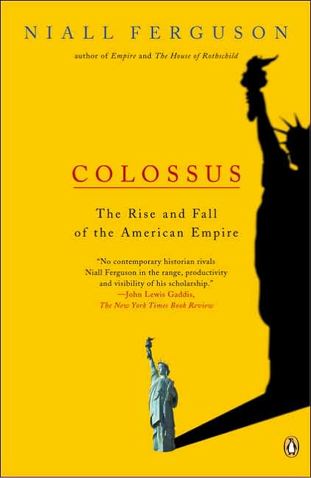
|
Colossus The Rise and Fall of the American Empire Niall Ferguson © 2004 -- read: 2007; posted: July 2007 Wow. I first encountered Ferguson on C-SPAN and was impressed with the depth and breadth of his historical knowledge and analysis. This book further solidified that first impression with its amazing review and comparative analysis of empires. Wesley Clark's Winning Modern Wars first opened my eyes to the idea of the USA as an empire ("virtual empire" in Clark's nomenclature), and Ferguson examines this fact in great detail making a convincing argument that we have much in common with empires of the past, especially the British Empire. A must read for perspective on our place in the world. In the preface added to the paperback edition, Ferguson provides a simplified outline of his book:
In the final chapter, Ferguson reviews the three deficits that explain why the USA empire is less effective than its British predecessor: economic, manpower, and attention. Understandably, he labels our attention deficit as the most serious, but I believe our economic deficit is the most ominous. Chapter 8, The Closing Door, contains an excellent analysis of our impending financial crisis drawing upon the Gokhale & Smetters study published in 2003 that concludes we face a shortfall of $45 Trillion (in present value). Our options to eliminate this fiscal imbalance, such as an immediate and permanent 69% income tax increase or 56% Social Security and Medicare cut, are politically untenable making a crisis inevitable. He reminds us that in the depression of the 1880s, "socialism thrived among farmers and workers while white-collar workers and small-business owners often turned to new strains of xenophobic nationalism." Also, after the worst of the Great Depression deflation, Nazism and fascism rose to bring us genocide and world war. If you don't plan to read this book, I urge you to at least read the preface in the paperback edition and Chapter 8. |
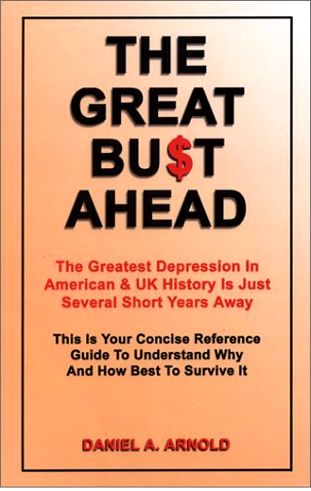
|
The Great Bust Ahead Dan Arnold ©2002 -- read: 2004; added: July 2005 This book applies demographic analysis to predict the stock market and economy. I believe the stock market and demographics are highly correlated, and this book does a reasonably straight forward job of presenting this correlation. However, the explanation is a bit overly simplistic and somewhat erroneous, and I do not agree with some of the details of the demographic model utilized. Regardless, the end result parallels my own work, so I have placed this book on my list. Furthermore, since I have not yet published my own demographic work nor my explanation and warning about the imminent, severe, protracted, and likely disastrous economic decline we face, I have placed Arnold's book near the top of my list. Arnold, who is not an economist (which may very well be an advantage for long range economic projections), is particularly weak in extending his stock market predictions to the economy overall. I do not believe the correlation between demographics and the economy (or the stock market and the economy) is as straight forward as Arnold indicates. (As a matter of fact, the USA economy averaged high GDP growth during the 70s while the stock market dropped significantly as predicted by the demographics of that era!) However, a 15-year decline in the stock market is very likley to be a drag on economic growth further compounding the drag from underfunded federal retirement programs and underfunded corporate pensions. Given the increasing instability of our economic makeup due to rising debt (both explicit in the form of the national debt and implicit in the form of unfunded Social Security and Medicare liabilities) and growing service and technology sector dominance, a demographic driven decline is likely to result in a depression, perhaps even of magnitude to fit Arnold's term "Greatest Depression". Thus, the overall message of this book (and my work) should not be ignored: Starting around 2012, our economy is going to enter a prolonged period of weakness that requires all citizens to begin preparations now! The author's website to promote this book provides a brief overview of the message. |
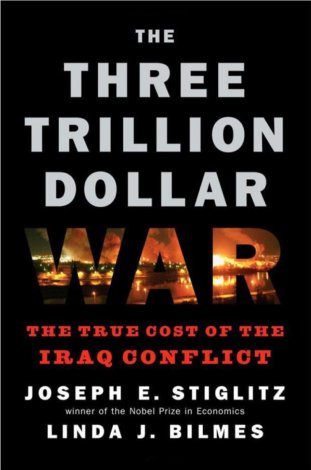
|
The Three Trillion Dollar War: The True Cost of the Iraq Conflict Joseph E. Stiglitz and Linda Bilmes ©2008 -- read: March 2008 (in progress); added: March 2008 Finally an independent, objective assessment of the total economic cost of the Iraq War. Nobel Laureate Professor Stiglitz of Columbia University has teamed up with Professor Bilmes of Harvard University to do both the detective work and the economic analysis necessary to determine the cost of the war to our ecconomy. They conservatively arrive at a three trillion dollar figure -- and that's the present and future cost if the war stopped on the date of publication. Perhaps this book will aid in dispelling the common misconception that war is good for the economy. |
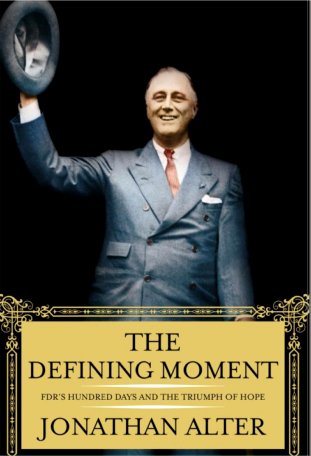
|
The Defining Moment FDR's Hundred Days and the Triumph of Hope Jonathan Alter © 2006 -- read: 2006; added: June 2007 A fresh look at Franklin Delano Roosevelt, his assent to the presidency, and his first 100 days in office during the worst of the Great Depression. Given that I believe we are facing another severe economic decline (which I project to begin around 2012) this is a particularly poignant book. It seems mainstream history has forgotten the political and sociological forces brought on by the Great Depression that threatened free enterprise capitalism and democracy itself. As summarized by President Roosevelt in 1936, and quoted on the opening page:
FDR was not a socialist as he is often portrayed today. To the contrary, he was a pragmatist fighting for the survival of free enterprise and individual rights against a rapidly growing populist movement towards socialism or fascism (which, as Hayek points out in The Road to Serfdom, are effectively the same thing). FDR held our system together enough for us to go on to defeat fascism, Nazi socialism, and later communism. This book does a great job of reminding us what FDR faced and who he really was. We can only wonder if another FDR will be able to hold us together in the next downturn when a wave of hungry, destitute, ailing old baby boomers is clambering (and voting en masse!) for government help while the economy disintegrates around them hampered by a mountain of debt. |
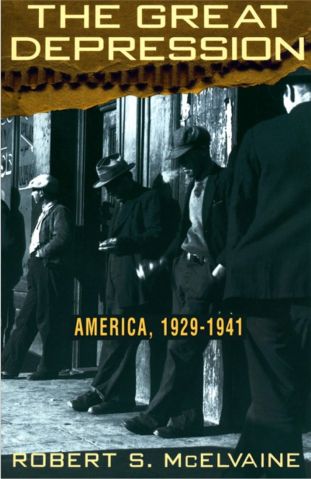
|
The Great Depression America 1929 - 1941 Robert S. McElvaine © -- read: 2005; added: January 2006 The best account of the Great Depression I have read. In particular, the exploration of the cause of the Great Depression is outstanding. McElvaine proposes that cycles of history provide the framework for understanding the Great Depression and I agree. Although McElvaine cites multiple causes of the Great Depression, he argues the greatest weight must be assigned to maldistribution of income. A table (p. 331) of historical income distribution does indeed show the disparity of incomes was greatest in 1929, and once the depression began, it makes sense that such a large disparity intensified the shock to the economy and deepened the malaise. However, I do not accept maldistribution of income as the paramount cause as I believe age demographics played that role. I also agree with the other widely accepted contributing "causes" of the Great Depression that McElvaine cites: bad monetary policy, anti-trade policy (Smoot-Hawley in particular), and unresponsive fiscal policy. These problematic government policies were supported by the prevailing views of business leaders as well as politicians. The author makes no effort to hide his bias against supply-side economics. He makes frequent analogies between Regan-era supply-side ideas and the prevailing economic policies leading up to the Great Depression. While I don't entirely agree with his analogies, and I understand why some critics find these interjections gratuitous, I do not feel they diminish the worthiness of this book. On the contrary, I find this author's open display of his politics and ideology refreshing. As an aside, the misuse and misunderstanding of supply-side economics by both its critics (eg. McElvaine) and its cheerleaders (eg. George Gilder), as well as politicians on both sides of the aisle, is an important topic that I explore here. Since I believe we are once again heading into a difficult economic period, I view this book as a must read. |
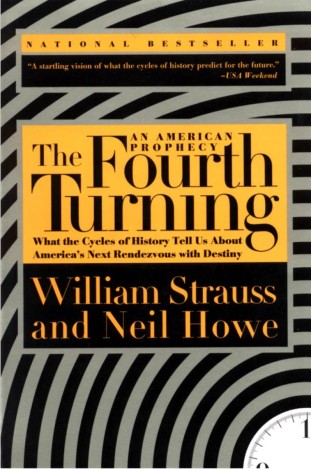
|
The Fourth Turning What the Cycles of History Tell Us About America's Next Rendezvous with Destiny William Strauss and Neil Howe © 1997 read: 2007 This book is a fascinating look at the recurring cycles of history. Strauss and Howe's first book, Generations, convinced me of the four turnings of the recurring cycle of history built upon a generational cycles that swing from being predominantly characterized by individualism to social order. Some great discussions of this book, including further contributions by the authors themselves (sadly, Strauss died in December 2007) on the author's website www.FourthTurning.com. |

|
Generations The History of America's Future, 1584 to 2069 William Strauss and Neil Howe © 1991 read: 1995 |
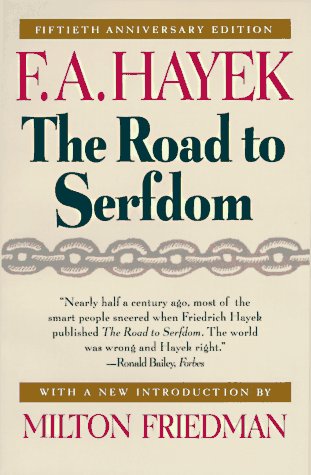
|
The Road to Serfdom F.A. Hayek ©1944 read: 2003 A brilliant expose on the dangers of socialism and its effective equivalence to fascism (Nazi: National Socialist German Workers' Party), and communism. The enduring influence of this book was evidenced by the Reagan and Thatcher revolutions. (Although, I believe more credit is given to those revolutions than is deserved for demographics were poised to lift the USA and UK economies during the early 80s.) Hayek convincingly warns of the dangers of government control or planning of an economy while acknowledging necessary legal and regulatory framework required to make competition as effective and beneficial as possible (ex. pg. 48). It seems free market proponents today often employ black-and-white reasoning to concepts of government regulation and planning when in reality, as Hayek points out, such matters are complex. Are lower taxes always better for the economy? Is less regulation always better? Hayek was the co-winner of the Nobel Prize in Economics in 1974. |
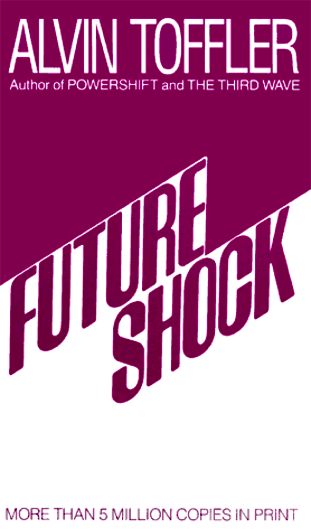
|
Future Shock Alvin Toffler ©1970 -- read: 2005; added: July 2005 The classic book about the accelerating change we are experiencing and what happens to people overwhelmed by change. The stated purpose is: "to help us come to terms with the future -- to help us cope more effectively with both personal and social change by deepening our understanding of how men respond to it." This book is as applicable today as when it was first published in 1970. |
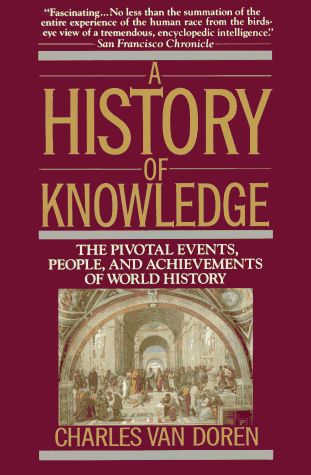
|
A History of Knowledge The Pivotal Events, People, and Achievements of World History Charles Van Doren ©1991 A condensed summary of all the transforming elements of history from ancient times, about five thousand years ago, to the present. I appreciate this book's approach of condensing history to pivotal, transforming elements since I am more enthusiastic about understanding the past than merely collecting knowledge of it. (This is probably the reason I was uninterested in grade school history but find myself fascinated by it as an adult.) I enjoyed reading it from cover-to-cover and also find it useful as a reference. Prior to writing this history, the author was an editor of Encyclopaedia Britannica, and before that, he garnered some notoriety as a scandalous contestant on the quiz show "Twenty-One." (The 1994 movie "Quiz Show" portrays the scandal.) In order to compress all that history into one book, the author had to determine which events, people, and achievements were pivotal and summarize them. In my opinion, he does a fantastic job. Some readers have criticized this book (on Amazon.com) because of neglected elements or biased interpretations, but the gift of teaching contained in this book overshadows any such criticism. Furthermore, the author never claims to have written "THE" history of knowledge, but "A" history of knowledge. He clearly strives for objectivity, but some bias is inherent in any such endeavor. |
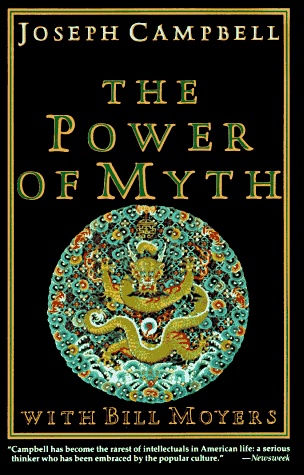
|
The Power of Myth Joseph Campbell with Bill Moyers ©1988 "Joseph Campbell (1904-1987) was a life-long student and teacher of the human spirit and mythology -- not just the mythology of cultures long dead, but of living myth, as it made itself known in the work of modern artists and philosophers -- individuals who searched within themselves and their societies to identify the need about which they were passionate." When he died, Newsweek magazine noted that "Campbell has become one of the rarest of intellectuals in American life: a serious thinker who has been embraced by the popular culture." This book contains the transcript of the 6-hour series of interviews by Bill Moyers that airs regularly on PBS. (Often available on DVD at local libraries, or ask me about borrowing mine!) I highly recommend watching these interviews because Campbell brings alive the vital role of mythology in our history and lives. Campbell possesses a wealth of knowledge and an awesome talent for explaining the power of myth. Even if you feel mythology doesn't interest you, as was the case when I stumbled upon the series, these fascinating interviews might surprise you: Campbell is entertaining at the very least, and he might change the way you see the world and yourself. |

|
Titan The Life of John D. Rockefeller, Sr. Ron Chernow ©1998 The definitive and engrossing biography of John D. Rockefeller. Rockefeller was a complex man whose true character and life has been overshadowed by caricatures of a ruthless robber baron and a stingy old man. This book takes a balanced look at the complex man behind the caricatures to provide an entertaining portrait of the man who left his permanent imprint on capitalism, America, and the world. Although Rockefeller's business tactics in starting Standard Oil were legal, his methods to dominate all vertical markets for oil production raise some ethical questions. To the muckrakers, Ida Tarbell being the best known, Rockefeller crossed the line into unethical, unlawful, and immoral behavior, and their opinions still echo through history. Chernow examines their criticisms and sorts out the facts behind their claims. After Standard Oil began producing vast wealth for Rockefeller, he worked just as hard, if not harder, to give it away effectively for the benefit of mankind. |

|
The Rise of Theodore Roosevelt Edmund Morris ©1979, 2001 The popular biography detailing the amazing life of Teddy Roosevelt up to the point in time when he became the youngest President in history (a position now held by President Kennedy). A well written account of a man who came from a wealthy family and worked hard to use the advantages he was given to better himself and his country. As a young man, Roosevelt had to overcome severe asthma and deal with the death of his young wife and mother on the same day. As a Republican politician, he fought to end government corruption, limit the monopoly power of business, and preserve our natural resource for future generations. "Speak softly and carry a big stick," the teddy bear, anti-trust laws, and National Parks are among the imprints Roosevelt left on America. |

|
Into Thin Air A Personal Account of the Mt. Everest Disaster Jon Krakauer © Once you start reading this book, you won't be able to put it down. A magnificently written personal account of a group adventure that went very wrong despite being guided by some of the best mountaineering professionals in the world. This book will immerse you in the drama of life or death decisions and thrill seekers drawn to such encounters. A must read. |
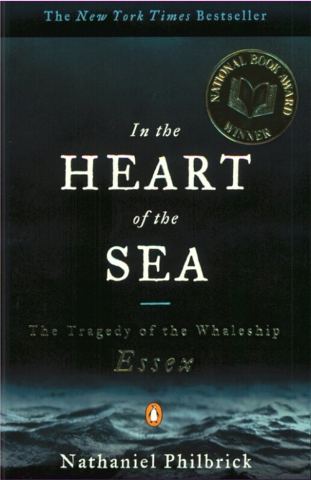
|
In the Heart of the Sea The Tragedy of the Whaleship Essex Nathaniel Philbrick © 2000 read: 2004 A riveting account of the whalers from Nantucket Island who set out in 1819 on a routine voyage on the Whaleship Essex that ended in disaster. The twenty-man crew lost their ship mid-voyage after it was battered by a whale. They salvaged three small boats and scant rations before setting out to cross 3,000 miles of ocean, but only eight survived. Two of the eight sailed almost 4,500 nautical miles across the Pacific before being rescued by another ship -- at least 500 miles farther than Captain Bligh's epic voyage in an open boat after being abandoned by Bounty mutineers, and more than five times farther than Sir Ernest Shackelton's famous passage to the South Georgia Islands to save his Endurance crew from a failed Antarctic expedition. The tragedy of the Whaleship Essex inspired Herman Melville's novel Moby-Dick. Thanks to Scot and Bether for recommending this one! |

|
Mayflower A Story of Courage, Community, and War Nathaniel Philbrick © 2006 read: 2007 An immensly enjoyable chronicle of the Pilgrims from the time they lived as religious seperatists in Scrooby, England, to the brutal King Philip's War with the Native Americans that broke out 54 years after their arrival in America. Beyond illuminating many details of the Piligrims' story that were unknown to me, I found the politics and economics of New England -- both Native American and Pilgrim -- during this period fascinating. The impact of European diseases on the Native Americans, which began before the Piligrims' arrival, and the mythological beliefs on both sides were powerful forces ever-present in the background as this collision of cultures unfolds. |
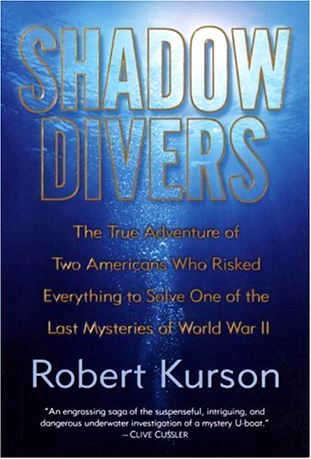
|
Shadow Divers The True Adventure of Two Americans Who Risked Everything to Solve One of the Last Mysteries of World War II Robert Kurson © 2004 -- read: 2005; posted: June 2005 The adventures of deep sea wreck divers and their quest in 1991 to identify a sunken German submarine (U-boat) off the New Jersy Coast. Another excellent book that immerses the reader in the world of explorers who risk their lives for adventure. The PBS show Nova dedicated an episode to the discovery of this U-boat titled Hitler's Lost Sub. Thanks to Jason for recommending this book and giving us a copy! |

|
Peace is Every Step The Path of Mindfulness in Everyday Life Thich Nhat Hanh ©1991 read: 2004 Although I have always been open minded, I would not have predicted I would be highly recommending a spiritual book written by a Vietnamese Buddhist monk. Yet, I feel this book provides very useful tools for keeping a balanced, relaxed attitude for making the most out of life, so it is a must read on my list. Even if a quest for peace seems a silly, offbeat endeavor for hippies, the message of mindfulness and tool of meditation are likely to be empowering in unforeseeable ways. On the other hand, if inner peace is already valued and sought, Thich Nhat Hanh may be the best teacher ever. Regardless, read it soon, and reread it often. Although short and simple, its depth and power is enormous. "The most profound satisfactions, the deepest feelings of joy and completeness lie as close at hand as our next aware breath and the smile we can form right now." If you feel spirituality, monks, and Buddhism are foreign ideas unsuitable for our modern, western world, consider that concepts of mindfulness and peace are present within the core of Judaism and Christianity as well. As an example, notice the message of mindfulness wrapped in this wonderful presentation of an interview with God. |
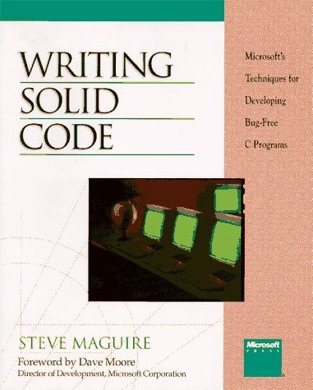
|
Writing Solid Code Microsoft's Techniques for Developing Bug-Free C Programs Steve Maguire ©1993 My old college friend Steve Maguire wrote this book. We worked together developing software at a small company in Tucson before moving on to respective careers at Microsoft and HP. Steve is a brilliant software engineer and a great guy with multifaceted interests. Steve and I share a similar software development philosophy, much of which is reflected in this book. I was enthusiastic when Steve told me of his idea to write this book, and helped him where I could by reviewing manuscripts and providing feedback. After a couple of rewrites, Steve found his writing style and a best seller emerged. Although ten years has elapsed since the initial publication, an eternity in the world of technology, this book is still a worthwhile read for those looking to improve their programming skills. |

|
The Crisis of Islam Holy War and Unholy Terror Bernard Lewis ©2003 read: 2004 An excellent concise summary of the history of Islam relevent to the recent crisis of terrorism that has infected this religion and threatens the world. In less than 200 pages, Lewis, a Princeton Professor Emeritus, explains the forces of history and religion that have molded Islam, and the factors behind the rise of Wahhabi backed terrorism. Here's one remarkable point made in this book: Were it not for Saudi support, Wahhabis would have remained stuck as a small group of medieval religious fanatics with little influence, rather than spreading strife within Islam and terrorism around the world. This book does not offer specific answers to the problems of terrorism, but makes it clear that the stakes are high for us and Muslims. If you have the slightest interest in learning about the Islamic world and understanding the terrorists we face, this is the book to read. An alternate opinion of this book worth reading is here. |
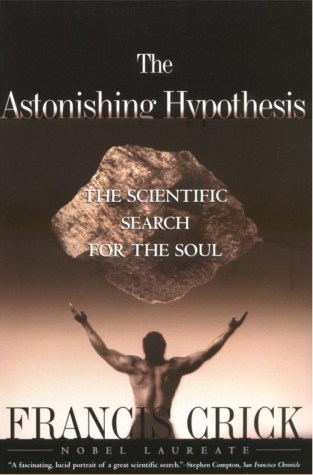
|
The Astonishing Hypothesis The Scientific Search for the Soul Francis Crick ©1994 Francis Crick shared the Nobel Prize for the 1952 discovery of DNA with his partner James Watson and Maurice Wilkins. (As an interesting aside, Crick stated that had Rosalind Franklin not died before the award decision, she deserved to share the Nobel Prize with them for her experimental work creating the world's best X-ray diffraction pictures of DNA.) Crick died in 2004, but the last part of his career was spent investigating the nature of consciousness, which is the focus of this book. The book provides an overview of the hypothesis that what we think of as consciousness and the soul are electro-chemical functions of the brain. I haven't stayed on top of this field and wouldn't be surprised if much more has been learned about the brain since this book was written. However, it provides a good overview of the field. |
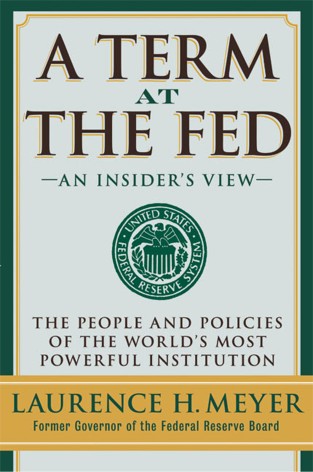
|
A Term at the Fed - An Insider's View The People and Policies of the World's Most Powerful Institution Laurence H. Meyer ©2004 -- read: 2008; posted: July 2008 Dr. Meyer's well written account of his 5 years as a Fed Governor is a must read on how the Fed works. Meyer impresses me as a smart, open, intellectually honest man, and I am grateful for this rare inside account of the Fed. Meyer's description of his interactions with the press and Chairman Greenspan are illuminating. Greenspan was indeed the Maestro as a chairman building consensus and leading the Fed, but did not orchestrate coordinated speeches nor testimony, and is credited with being first in identifying accelerating productivity. Dr. Meyer confirmed my hunch that rate cuts during the 1998 Asian/Russian/LTCM crisis were made in reaction to the stock and bond markets rather than being rooted in economic analysis. At the time, I didn't think the economic impact of these crises justified three Fed cuts, so I anticipated excessive momentary expansion would flow into stocks and push inflation higher, which it apparently did. In agreement with me, Meyer writes (pg. 148):
One topic was conspicuously absent: the measure of inflation. Meyer discusses the dual mandate of the Fed to balance full employment and low inflation, and he alludes to the fact that Greenspan felt the Consumer Price Index (CPI) overstated inflation by about one-percent. However, he makes no mention of the fact that the very definition of the CPI changed while he was Fed governor to bring it closer in line with Greenspan's assessment. Changing the CPI formulation is a big deal, and given the importance of inflation in Fed policy and Dr. Meyer's academic background, he must have some views on this metric; yet, he makes no mention of it. |
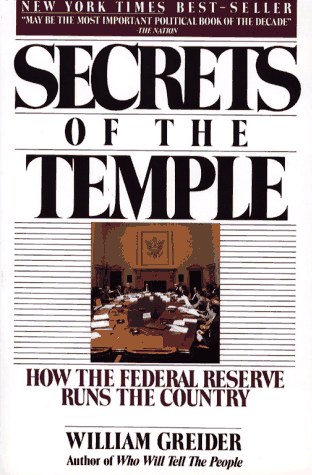
|
Secrets of the Temple How the Federal Reserve Runs the Country William Greider ©1987 read: 1994 I hesitated placing this book on my list because the title implies a conspiracy within the Federal Reserve (the Fed) to control our country. Although the Fed is a powerful and largely independent part of our government, it does not "run the country." Furthermore, what influence the Fed does wield over the economy is ultimately limited by the economy itself, as documented in this book. For example, page 528 states, "When the Fed finally turned, the change in monetary policy was forced upon it by events." Notwithstanding the title, this book contains a good examination of the operation of the Fed and the nature of money. It also provides particularly detailed reporting on the Volcker years, which was a period of unforeseen, and generally still unexplained, interaction between monetary policy and the economy requiring the creation of a new term in the economic lexicon: stagflation. |
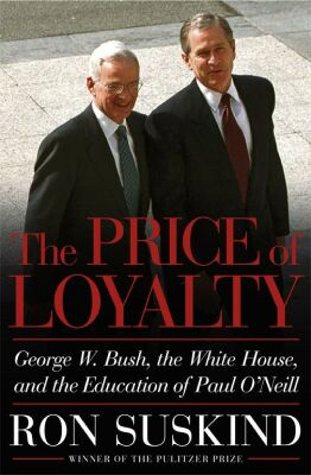
|
The Price of Loyalty George W. Bush, the White House, and the Education of Paul O'Neill Ron Suskind ©2004 read: 2004 I have great respect for former Treasury Secretary Paul O'Neill, and this book further solidified that respect. He is a smart, open minded, hard working man of the highest integrity. As a member of President Bush's (49) cabinet, Mr. O'Neill had a rare glimpse of the internal workings of the administration, although he reveals he was excluded from the president's inner circle. O'Neill is not the author, but made available his entire schedule and every document that crossed his desk while he was Treasury Secretary and his detailed personal notes. He was available to the author for interviews and personally reviewed the book for accuracy. In the end, O'Neill was unwilling to pay the price of his own fidelity to maintain total loyalty to the President, foreshadowed in the opening quote:
Beyond an eye opening glimpse inside the Bush White House and the tenure of Paul O'Neill, this books provides great insight into how a brilliant and experienced executive solves problems. |
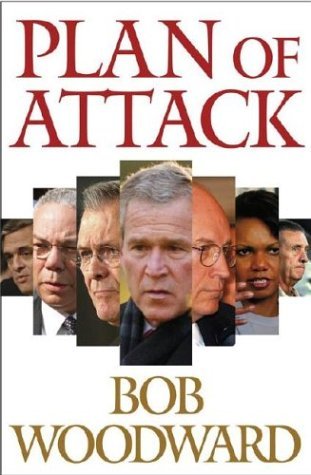
|
Plan of Attack Bob Woodward ©2004 read: 2004 The definitive account of how and why President Bush (49), his war council, and allies launched a preemptive attack to topple Saddam Hussein and occupy Iraq. Woodward has emerged as the preeminent investigative reporter of our time, and that reputation grants access generally unavailable to other reporters. Page 425 reports Bush's reasons for providing Woodward access to members of his administration and himself: The president said he believed the record would show that he, Rumsfeld, Franks and the other military people developed a war plan that carefully targeted Saddam, the Baathist leadership and inner circle, and their means to retain power. The war was precisely directed at them and that apparatus -- military, security service, secret police. As much as possible average Iraqis were spared. It would be a blueprint of historical significance that, he said, "will enable other leaders, if they feel like they have to go to war, to spare innocent citizens and their lives." Telling that story was one of the chief reasons the president said he had agreed to be interviewed in depth about the war, and why he wanted Rumsfeld and others in the administration to answer my questions. "But the news of this, in my judgment, the big news out of this isn't how George W. Bush makes decisions," he said. "To me the big news is America has changed how you fight and win war, and therefore makes it easier to keep the peace in the long run. And that's the historical significance of this book as far as I'm concerned." It remains to be seen to what extent the president's "big news" bears out. The book reveals far less planning was put into winning the peace than winning the war. Personality conflicts and stubbornness within the administration appear to have hampered planning for the transition from war to nation building. Colin Powell's prescient "you break it, you own it" (p 150) warnings appear to have gone largely unheeded, and with mounting post-war casualties, the administration has already recast "Mission Accomplished" as "Catastrophic Victory." |
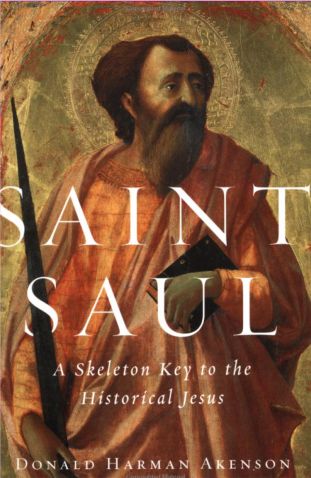
|
Saint Saul A Skeleton Key to the Historical Jesus Donald Harman Akenson ©2000 read: 2001 In Saint Saul, historian Akenson offers a provocative account of what we can learn about Jesus by reading the letters of Paul. As the only direct evidence of Jesus composed before the destruction of the Second Temple in 70 CE forever altered the outlook of the Christian and Jewish faiths, Akenson argues that these letters are the most reliable source of information. He dismisses the traditional method of searching for facts about Jesus by looking for parallels among the four gospels because they were handed down to us as a unit by a later generation. Akenson painstakingly recreates the world of Christ, a time rich with ideas, prophets, factions, priests, savants, and god-drunk fanatics. He emphasizes the Jewishness of Jesus, referring to Jesus and Paul as Yeshua and Saul, as they were then known. I especially appreciated this book because it emphasizes the methotical approach of historians to studying this era. Thanks to Scot for recommending this one! |
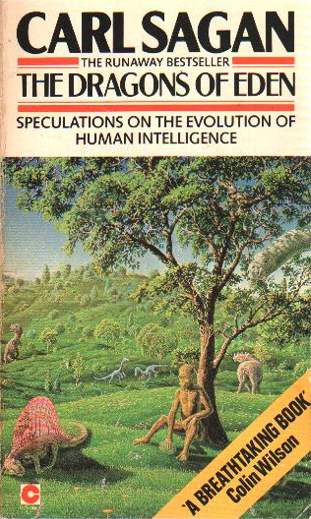
|
The Dragons of Eden Speculation on the Evolution of Human Intelligence Carl Sagan ©1977 -- read: 1977, 2002; updated June 2005 My Great Uncle Jack bought me this book when I was fifteen. Since then, the cover has changed (original cover shown), and the Pulitzer Prize has been awarded. Rereading it recently, I appreciate it even more. Even with all the advances in science since its publication, this book has stood the test of time. Of course, with the passage of so much time, much new evidence and experimental findings are not included. (Of particular note is the overwhelming evidence that has emerged in support of the theory that the impact of a large asteroid caused the extinction of the dinasoarus.) Regardless, Sagan's extrapolations and insights into the development of human intelligence remain both relevant and fascinating. |
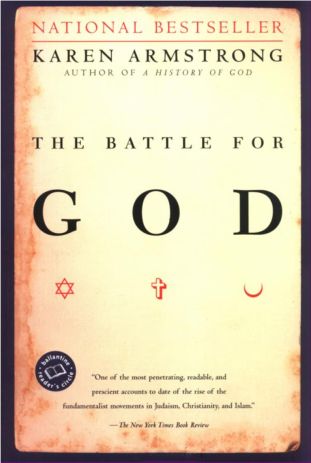
|
The Battle for God Karen Armstrong ©2000 read: 2002 The history and evolution behind the rise of religious fundamentalism of American Protestants, Israeli Jews, and Iranian and Egyptian Muslims. |
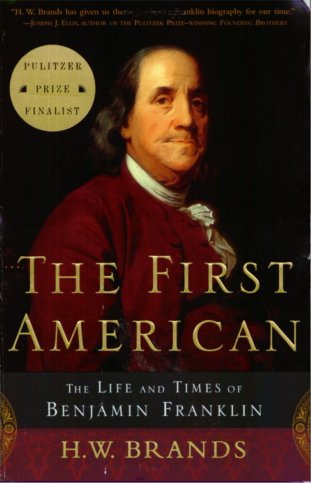
|
The First American The Life and Times of Benjamin Franklin H.W. Brands ©2000 read: 2000 A wonderful biography of a brilliant, fascinating man. This book persuaded me that Franklin was indeed the first American, as its title proclaims. One aspect of Franklin that made a lasting impression was his skepticism about religion. During the Continental Congress meetings to ratify the constitution, the matter of slavery, which Franklin was against, became very contentious. Even though Franklin was not religious, he suggested prayers be recited to open sessions, but was overruled. Professor Brands has become one of my favorite modern historians. |
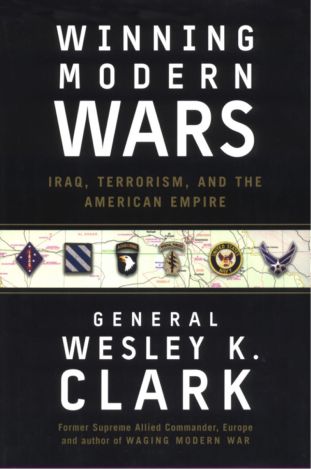
|
Winning Modern Wars Iraq, Terrorism, and the American Empire Wesley K. Clark ©2003 read: 2004 Retired General Clark proposes that modern wars are won not only on the battlefield but in the television studio, diplomatic lobbies of international organizations, and, perhaps most of all, in the hearts and minds of civilian populations. A concept within this book that made an impression on me is the nature of the American Empire. Unlike past empires that sought to rule over others, America has been a virtual empire. He postulates that our virtual empire is put at risk by internationally unpopular military operations seen as imperial. |
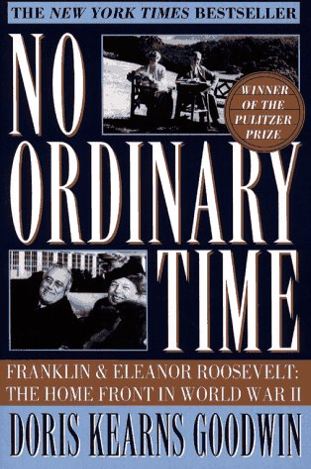
|
No Ordinary Time Franklin & Eleanor Roosevelt: The Home Front in World War II Doris Kearns Goodwin ©1994 -- read: 1996; added: June 2005 |
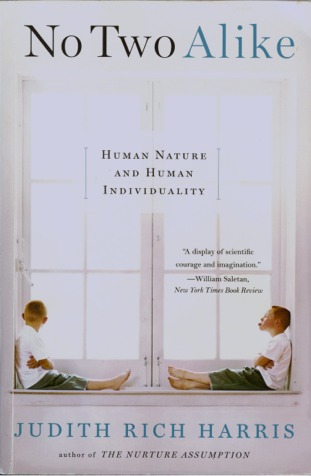
|
No Two Alike Human Nature and Human Individuality Judith Rich Harris ©2006-- read: 2008; added: June 2008 Harris's first book The Nurture Assumption caused tremendous controversy within the scientific community. In the first half of this second book, she reviews the concepts in and responses to her first book and explains the path of elimination she takes to discover the source of personality differences: a proposed theory of a status system in the brain that interacts with society resulting in group socialization. Harris explains that 45% of our personality can be attributed to genetics, and what's left cannot be accounted for at all by nuture (parenting). She provides detailed examples of poor quality research published on this subject. Some readers felt she takes her criticism of professional research scientists too far, but I greatly appreciate this important aspect of her book and work. Harris does a great service to the scientific community and the persuit of knowledge by exposing egregiously flawed work. I also appreciated her explanation of the fundamental attribution error: The tendency for people to assume a person's actions depend more on what "kind" of person they are rather than on the situation of the person. Although this is a great book and I admire Harris, I'm not sure I fully accept her conclusions yet. In particular, I am troubled by her statement (pp. 60-1) that parenting certainly matters, but differences in parenting have nothing to do with how children turn out as long as the kind of care the parents provide is within the normal range for our species. To further explain this range of normal parenting, she states:
|
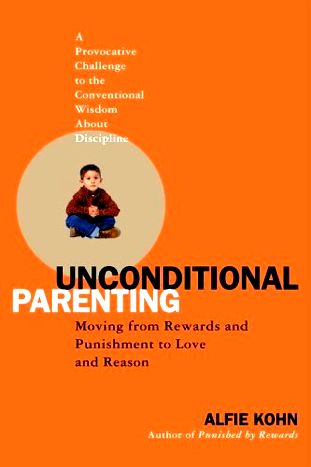
|
Unconditional Parenting Moving from Rewards and Punishment to Love and Reason Alfie Kohn ©2005-- read: 2005; added: June 2005 This is an extremely thought provoking, well written book. I have not decided the extent to which I agree with the ideas or methods proposed although most of them immediately made great sense. (Check back soon for further thoughts.) Also, until I am actually an experienced parent, I won't be able to comment on the practicality of implementing the parenting techniques in this book, or any book for that matter. I would love to hear other parent's thoughts on this book; however, I suspect it will be difficult to get complete feedback unless a consistent effort has been made to employ these ideas. It's interesting to consider how the advice and perspectives in this book dovetail with Generations ... more on that later ... Great find Bether! |
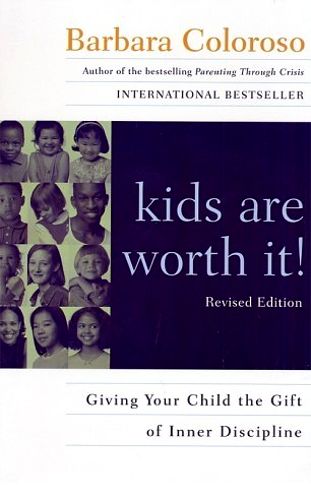
|
Kids are worth it! Giving Your Child the Gift of Inner Discipline Barbara Coloroso ©1995-- read: 2005; added: July 2005 Thanks to Becky Roy for giving us this book! |
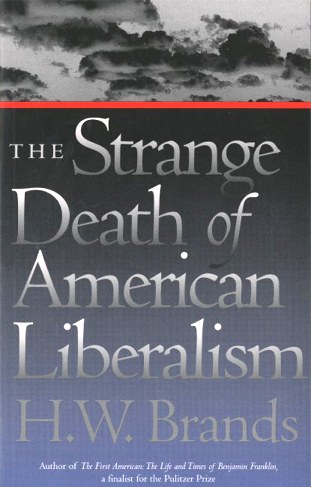
|
The Strange Death of American Liberalism H.W. Brands © 2001 -- read: 2006; added: Auguest2006 My favorite modern historian presents his argument that liberalism is dead and the Cold War was a necessary precondition for the success of postwar [WWII] liberalism. Professor Brands starts his book by clearly defining what he means by "liberalism," and I found such clarification refreshing. After all, it was only about 50 years ago when "liberal" had almost the exact opposite meaning of that intended by its common usage today! (For example, in Hayek's Road to Serfdom "liberalism" is the ideal yet this book is practically a conservative supply-side bible today.) I have yet to decide if I agree with Professor Brand's argument; however, his book is a fascinating romp through American history and his argument is compelling. More later ... |
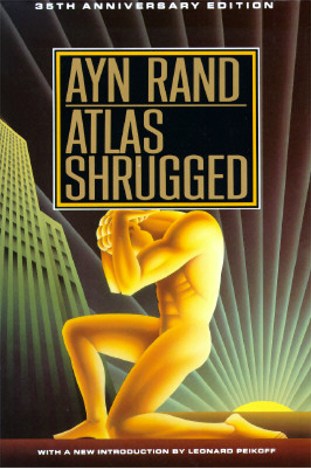
|
Atlas Shrugged (Fiction) Ayn Rand © 1957 -- read: 2005; added: June 2006 Ayn Rand's masterpiece. "Who is John Galt?" is the first sentence, and words I first encountered as graffiti from the back seat of my parent's car in the 70s. I won't review this novel here because to do so necessarily gives away the plot and spoils the mystery at its center. This fictional story, which Rand spent 14-years crafting from concept to publication, is based upon her philosophy, later named "objectivism." Rand was a self-motivated escapee of communist Russia at an early age. I recommend this book because it is thought provoking and continues to have an impact on American culture, not because I have arrived at a point of complete acceptance of Rand's philosphy. At the same time, I am unable to specifically disagree with ideas presented in this book and find them optimistic, uplifting, and motivating. Ayn Rand often said "check your premises," and this book leads one to do just that. If you find yourself hating this book, as many do, it may be the result of an unwillingness to explore your premises. I still have not completely reconciled all the premises of my world with Atlas Shrugged, but many of mine have been made clearer by the experience of reading it. This novel is among the longest ever written, and I recommend reading the hardback edition because the paperback font is so small it is a source of eye strain. If you don't have the time or inclination to read the book, many plot-spoiling outlines are available on the Internet. A 1991 Library of Congress study concluded Atlas Shrugged is considered the second most influencial book in the lives of its readers (after the Bible). In the early 90s I also heard that Atlas Shrugged showed up on more Billionaires' lists of influential books than any other book although I can't cite a source for this. |
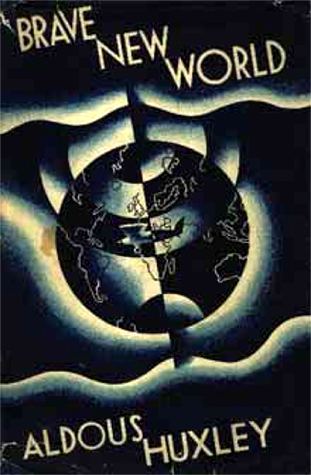
|
Brave New World (Fiction) Aldous Huxley © 1932 -- read: 2006; added: August 2006 This novel reveals fascinating insight into mankind. Although it is science fiction set in the future, it is thought provoking about the nature of man and society. |

|
The Diving Bell and the Butterfly (Memoir) Jean-Dominique Bauby © 1997 -- read: 1999; added: June 2015 The author wrote this memoir by blinking his left eye because that was the only part of his body he could control after suffering a stroke at the age of 43. Because the stroke occurred at the base of his brain, he suffered from locked-in syndrome, which leaves cognition in tact without the ability to control voluntary movement of any part of the body except the eyes. Life's precious moments and struggles are beautifully captured in this book. The 2007 movie of the same title is also wonderful and worth seeing after reading the book. |

|
Freakonomics A Rogue Economist Explores the Hidden Side of Everything Steven D. Levitt and Stephen J. Dubner ©2005 -- read: 2005; added: July 2005 A young economist brings a fresh, unconventional perspective to data analysis to reveal hidden factors and incentives that affect people's behavior in several unrelated categories of interest to him. For example, which is more dangerous, a gun or a swimming pool? Did legalizing abortion result in less crime? What impact do parents have on their children's test scores? The book draws some fascinating conclusions that range from thought provoking to eye-opening. Although I recommend this book, I am disappointed the authors do not provide more explanation of the data and analysis utilized to draw their conclusions. They provide some references in the notes section in the back, but I prefer more discussion of salient data issues in the main text or footnotes. Most likely, they did not want the book to get bogged down in data and statistics, potentially making it less readable. The casual reader is left to assess the author's credibility rather than the veracity and validity of their work -- perhaps a reasonable approach for widely published conclusions exposed to review and critique on the Internet (already here and here for their conclusions linking crime and legalized abortion, a perennial lightning rod for controversy). For me, however, the world is fraught with lies, damned lies, and statistics, so without adequate presentation for at least a cursory assessment of the statistical methods, I am left frustrated with lingering doubts about the work. Here is an NPR interview with the author and a short excerpt. Here's a BBC report about the book and author. |